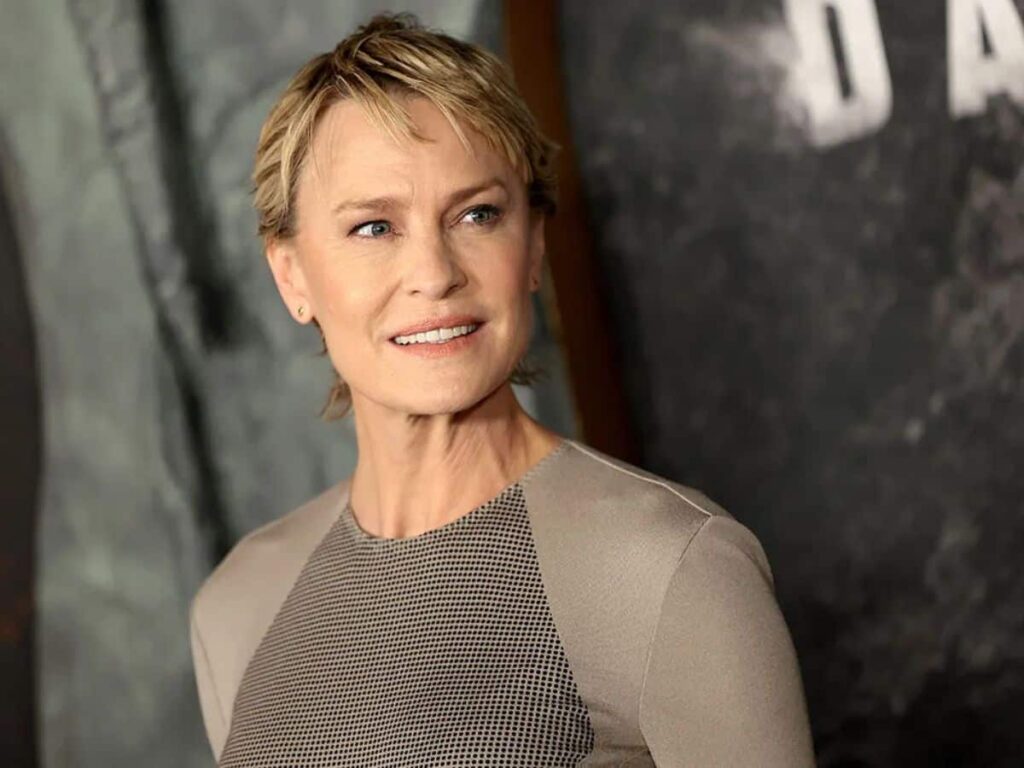Robin Wright, the steely force behind Claire Underwood in Netflix’s House of Cards, has once again proven she’s a powerhouse both on and off the screen. At the 2025 Monte-Carlo TV Festival, where she was honored with the prestigious Crystal Nymph Award, Wright shared a riveting account of her battle for equal pay with co-star Kevin Spacey, revealing the creative workaround producers offered to bridge the gap. From her iconic roles in Forrest Gump and The Princess Bride to her directorial ventures and outspoken stance on AI’s impact on Hollywood, Wright’s journey is a masterclass in resilience and reinvention. With a net worth of $65 million and a career spanning four decades, this blog dives into her remarkable story, her industry influence, and the bold moves that continue to captivate audiences worldwide.

From Santa Barbara to Stardom: Robin Wright’s Early Days
Born on April 8, 1966, in Dallas, Texas, Robin Gayle Wright grew up in San Diego, California, with a knack for performance that shone early. Her mother, Gayle, was a cosmetics executive, and her father, Fred, worked in pharmaceuticals, but it was Robin’s modeling gigs at 14 that set her on a path to fame. After graduating from La Jolla High School, she briefly modeled in Paris and Japan before landing her first major acting role as Kelly Capwell on the soap opera Santa Barbara (1984–1988). Her portrayal earned three Daytime Emmy nominations, showcasing her ability to convey depth in a genre often dismissed as lightweight.
Wright’s transition to film was seamless. At 21, she stole hearts as Buttercup in Rob Reiner’s The Princess Bride (1987), a cult classic that remains beloved for its wit and romance. Her chemistry with Cary Elwes and her poised delivery made her a standout, cementing her as a rising star. By the early 1990s, she was fielding offers from Hollywood’s elite, turning down roles in Jurassic Park and Batman Forever to prioritize artistic projects and her young family with then-husband Sean Penn.
The Defining Role: Claire Underwood in House of Cards
Wright’s career reached new heights with House of Cards (2013–2018), Netflix’s groundbreaking political drama. As Claire Underwood, the calculating and ambitious wife of Frank Underwood (Kevin Spacey), she delivered a performance that redefined television antiheroes. Her icy poise, razor-sharp dialogue, and ability to command scenes earned her a 2014 Golden Globe for Best Actress in a Drama Series—the first for a streaming series—and six consecutive Emmy nominations. Critics hailed her as the show’s backbone, with The New York Times calling her “a master of understated menace.”
When Spacey was ousted in 2017 amid misconduct allegations, Wright took the reins for the sixth and final season, anchoring the show as President Claire Underwood. Her leadership, both on-screen and behind the scenes as an executive producer and director of 10 episodes, including the finale, proved her mettle. The season, while divisive, showcased her ability to carry a global hit under pressure, solidifying her as a trailblazer in the streaming era.
The Equal Pay Fight: A Battle for Parity
At the Monte-Carlo TV Festival on June 15, 2025, Wright captivated audiences with her candid recounting of her fight for equal pay on House of Cards. Despite Claire Underwood’s equal narrative weight, Wright earned less than Spacey, who reportedly commanded $500,000 per episode to her $420,000. When she demanded parity, producers balked, citing Spacey’s 1999 Oscar for American Beauty. Their solution? Three separate paychecks for acting, directing, and executive producing to match his total compensation. “They said, ‘We can’t pay you the same as an actor, so we’re going to divvy it up,’” Wright recalled, adding their blunt rationale: “Because you didn’t win an Academy Award.”
Wright’s negotiation, first publicized in 2016 when she threatened to “go public” unless paid equally, was a landmark moment in Hollywood’s gender pay discourse. By leveraging Claire’s popularity—“She was bigger than Frank in some countries,” she noted—she secured a deal that not only closed the gap but expanded her creative control. Her story, shared alongside peers like Jennifer Lawrence and Viola Davis, exposed systemic inequities, where women in Hollywood earned 82 cents for every male dollar in 2024, per USC Annenberg. Wright’s triumph inspired actresses to demand fair treatment, reshaping industry norms.
A Visionary in the Streaming Boom
Wright credited director David Fincher for House of Cards’ revolutionary impact, recalling his prediction: “This is going to be our future. We’re going to launch streaming… and it’ll be revolutionary.” Launched in 2013 with Netflix’s all-at-once release model, the show pioneered binge-watching and elevated streaming platforms, now a $200 billion industry. Wright’s role as Claire positioned her at the forefront of this shift, with the series’ global reach—viewed in 190 countries—amplifying her influence. Her Monte-Carlo remarks underscored the show’s legacy: “It changed how we tell stories and how audiences connect with them.”
Directing and Producing: Wright’s Creative Evolution
Wright’s ambition extends beyond acting. Her directorial debut, Land (2021), a stark drama about a woman seeking solitude in Wyoming’s wilderness, premiered at Sundance to critical praise for its raw intimacy. She directed episodes of Ozark and is developing a TV adaptation of The Silent Wife, showcasing her knack for complex narratives. Her latest project, The Girlfriend (July 2025, Prime Video), sees her star as Laura Cavendish, a mother unraveling her son’s mysterious relationship, while directing and executive producing with Rola Bauer. A tense scene previewed at Monte-Carlo highlighted Wright’s ability to blend emotional depth with suspense.
Her producing credits, including House of Cards and The Girlfriend, reflect her desire to shape stories from inception. At Monte-Carlo, Bauer praised Wright’s “instinctive understanding of character,” noting their collaboration as a creative pinnacle. Wright’s multifaceted roles underscore her refusal to be boxed into one lane, a rarity for actresses her age.
The AI Debate: A Voice of Caution
Wright’s Monte-Carlo interview with Deadline tackled artificial intelligence’s growing presence in Hollywood, a hot-button issue post-2023 WGA and SAG-AFTRA strikes. She expressed alarm at AI’s potential to displace jobs in writing, editing, and production: “It frightens me for our industry… people are going to lose jobs.” Yet, she remains confident in acting’s human essence. “I don’t think AI can ever take over acting because it won’t capture the emotion in the eyes,” she said. “You’ll never feel the resonance from that actor.” Her stance, balancing concern with optimism, resonates with industry fears about AI’s $1 trillion economic impact by 2030, per McKinsey, while defending the irreplaceable spark of human performance.
A Storied Career: From Forrest Gump to Wonder Woman
Wright’s four-decade career is a tapestry of iconic roles. Her portrayal of Jenny in Forrest Gump (1994), a troubled soul navigating love and loss, earned her a Golden Globe nomination and endeared her to millions. She followed with critically acclaimed performances in Moll Flanders (1996), She’s So Lovely (1997), and White Oleander (2002), showcasing her range. Her collaboration with Sean Penn in Hurlyburly (1998) and The Crossing Guard (1995) highlighted her ability to tackle raw, emotional characters.
In recent years, Wright’s role as Antiope in Wonder Woman (2017) and Wonder Woman 1984 (2020) brought her to a new generation, her fierce warrior presence stealing scenes. Other notable films include Blade Runner 2049 (2017), where she played the enigmatic Lieutenant Joshi, and Beowulf (2007), a motion-capture epic with Angelina Jolie. Her selective approach—turning down blockbusters like The Firm to focus on passion projects—reflects her commitment to artistry over fame.
Wealth and Lifestyle: A $65 Million Empire
Robin Wright’s net worth is estimated at $65 million (Rs. 550 crore) in 2025, built through acting, directing, producing, and savvy investments. Her House of Cards earnings peaked at $9 million for the final season, with additional income from directing ($450,000 per episode) and producing. Endorsements with brands like L’Oréal Paris and roles in high-budget films like Wonder Woman ($100 million budget) bolstered her wealth. Real estate investments include a $3.2 million Los Angeles home sold in 2018 and a $6 million Santa Monica property co-owned with ex-husband Sean Penn.
Wright’s lifestyle blends understated elegance with creative passion. She resides primarily in Los Angeles, often spotted at industry events like Monte-Carlo in chic, minimalist attire. Her 2018 marriage to Clément Giraudet, a Saint Laurent executive, ended in 2022, but their shared love of fashion influenced her public style. Wright’s two children with Penn—Dylan (33), a model and actress, and Hopper (31), an actor—remain close, with Dylan joining her at Monte-Carlo. Her philanthropy, supporting organizations like the Enough Project for conflict-free minerals, reflects her commitment to social causes.
Personal Life: Love, Loss, and Resilience
Wright’s personal journey has been as compelling as her roles. Her 1986–1988 marriage to Santa Barbara co-star Dane Witherspoon ended amicably, but her 14-year marriage to Sean Penn (1996–2010) was a media frenzy. The couple, dubbed Hollywood royalty, faced publicized strains, including Penn’s rumored affairs, but co-parented Dylan and Hopper with dedication. Wright’s 2012–2015 engagement to actor Ben Foster and her marriage to Giraudet showcased her openness to love, though she values privacy. “I’m not one for the tabloids,” she told Vanity Fair in 2021. Her strength through divorce and career pivots mirrors the tenacity of her characters.
Industry Impact and Monte-Carlo Honor
The Monte-Carlo TV Festival’s Crystal Nymph Award, presented on June 15, 2025, celebrated Wright’s transformative impact. Joining luminaries like Patricia Arquette, the award recognized her as a “formidable talent” who reshaped television through House of Cards. Her panel with Rola Bauer drew industry leaders, with fans on X praising her “class and conviction.” One post read, “Robin Wright’s Monte-Carlo speech on equal pay is iconic—she’s a legend.” Her advocacy for pay equity and AI protections positions her as a thought leader, amplifying her influence at 59.
The Road Ahead: Projects and Legacy
Wright’s upcoming projects promise to sustain her momentum. The Girlfriend is poised to be a Prime Video hit, with early buzz comparing it to Big Little Lies for its psychological depth. She’s also attached to direct a The Silent Wife adaptation and is rumored for a role in Denis Villeneuve’s Dune: Messiah (2027). Her production company, Pour Moi Productions, is developing female-driven stories, aligning with her mission to elevate women’s voices. “I want to tell stories that matter,” she told Deadline.
Wright’s legacy transcends her roles. Her equal pay fight, streaming pioneering, and directorial ventures have reshaped Hollywood, inspiring actresses like Anya Taylor-Joy, who cited Wright as a mentor. As streaming platforms dominate and AI looms, Wright’s insistence on human storytelling and fair treatment remains a beacon. Her Monte-Carlo moment wasn’t just a celebration—it was a testament to a career that continues to challenge, captivate, and redefine what’s possible.
Disclaimer: This blog is based on publicly available information from news reports and social media posts as of June 17, 2025. The content is rephrased for clarity while preserving the essence of the sources. Details about Robin Wright’s projects and personal life are subject to change.
Source: News reports from Deadline, Variety, The Hollywood Reporter, Vanity Fair, Forbes, and posts on X.
For MoRe information : Click Here




